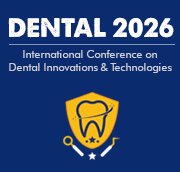Title : Dentinal collagen stabilization- key to successful composite restorations
Abstract:
Composite resin restorations have overtaken any other dental materials for restoration of anterior as well as posterior teeth because of its esthetic and adhesive properties. Resin-dentin bond is solely dependent on the hybrid layer. Due to the acid etch technique in total etch technique and prolonged etching action in case of self etch adhesives, there is a time-dependent degradation of the dentinal collagen which debilitates the hybrid layer. This ultimately leads to microleakage and secondary caries formation causing the failure of composite restoration causing distress to both the patient and the clinician. Increased knowledge of role of enzymatic degradation has led to extensive research in the preservation of the hybrid layer. Various strategies are being studied to avert the deterioration of hybrid layer. Inhibition of the proteolytic enzymes and stabilising of exposed dentinal collagen has been a topic of extensive research for preserving the hybrid layer and provide better quality composite restorations. Use of dentinal biomodifiers which could be employing physical methods such as administration of ultraviolet radiation and use of chemical agents which could be synthetic eg. chlorhexidine, glutaraldehyde, carbodolimide, chitosan, chitosan nanoparticles or natural such as curcumin, proanthocyanidin, etc for collagen stabilisation is gaining interest. The objective is to review the current literature on preserving dentinal collagen while bonding and also to propose a research hypothesis of formulating a newer generation of dentin bonding agent by incorporating a collagen stabilising agent. The aim of this presentation is to throw light on collagen stabilisation to enhance dentin bonding, to pave way for a new era of everlasting composite restorations and improve the overall quality of the dental treatment.



